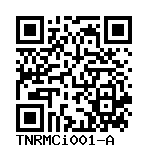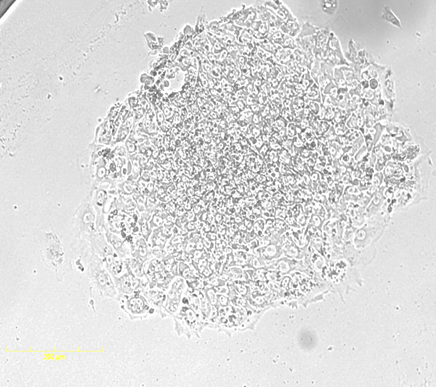iTAF32
TNRMCi001-A
General
Cell Line |
|
| hPSCreg name | TNRMCi001-A |
| Cite as: | TNRMCi001-A (RRID:CVCL_D0MZ) |
| Alternative name(s) |
iTAF32
|
| Cell line type | Human induced pluripotent stem cell (hiPSC) |
| Similar lines |
RNRMUi005-A (EB-iPSC-d4, RDEB-iPSC-d4) Donor diseases: Epidermolysis Bullosa Simplex recessive dystrophic epidermolysis bullosa UNIZARi001-A (FiPSTK2-2) Donor's gene variants: TK2, TK2 Donor diseases: Mitochondrial DNA depletion syndrome, myopathic form |
| Last update | 22nd August 2023 |
| User feedback | |
Provider |
|
| Generator | Tomsk National Research Medical Center of the Russian Academy of Sciences (TNRMC) |
| Owner | Tomsk National Research Medical Center of the Russian Academy of Sciences (TNRMC) |
| Distributors | |
| Derivation country | Russia |
External Databases |
|
| BioSamples | SAMEA114292483 |
| Cellosaurus | CVCL_D0MZ |
| Wikidata | Q123033635 |
General Information |
|
| * Is the cell line readily obtainable for third parties? |
No |
Donor Information
General Donor Information |
|
| Sex | male |
| Age of donor (at collection) | 15-19 |
| Ethnicity | Caucasian |
Phenotype and Disease related information (Donor) |
|
| Diseases | A disease was diagnosed.
|
| Disease associated phenotypes | no phenotypes |
Karyotyping (Donor) |
|
| Has the donor karyotype been analysed? |
Unknown
|
Other Genotyping (Donor) |
|
| Is there genome-wide genotyping or functional data available? |
No
|
External Databases (Donor) |
|
| BioSamples | SAMEA114292484 |
Ethics
| Has informed consent been obtained from the donor of the embryo/tissue from which the pluripotent stem cells have been derived? | Yes |
| Was the consent voluntarily given? | Yes |
| Has the donor been informed that participation will not directly influence their personal treatment? | Yes |
| Can you provide us with a copy of the Donor Information Sheet provided to the donor? | No |
| Do you (Depositor/Provider) hold the original Donor Consent Form? | Yes |
| Alternatives to consent are available? | No |
| Is there other documentation provided to the donor for consenting purposes? | No |
| Confirm that consent was obtained by a qualified professional | Yes |
| Has the donor agreed to be re-contacted? | No |
| Has the donor been informed about how her/his data will be protected? | Yes |
| Please indicate whether the data associated with the donated material has been pseudonymised or anonymised. | pseudonymised |
| Does consent explicitly allow the derivation of pluripotent stem cells? | Yes |
| * Does consent expressly prevent the derivation of pluripotent stem cells? | No |
| * Does consent pertain to a specific research project? | No |
| Does consent permit unforeseen future research, without further consent? | Yes |
| Does the consent permit uses of donated embryo/tissue or derived cell line intended for clinical treatment or human applications? | No |
| Does consent expressly prevent development of commercial products? | No |
| Does consent expressly prevent financial gain from any use of the donated embryo/tissue, including any product made from it? | No |
| Does consent expressly permit storage of donated embryo/tissue for an unlimited time? | Yes |
| Does consent expressly permit storage of cells derived from the donated embryo/tissue for an unlimited time? | Yes |
| Does consent prevent the DONATED BIOSAMPLE from being made available to researchers anywhere in the world? | No |
| Does consent prevent CELLS DERIVED FROM THE DONATED BIOSAMPLE from being made available to researchers anywhere in the world? | No |
Does consent permit research by | |
| an academic institution? | Yes |
| a public organisation? | No |
| a non-profit company? | No |
| a for-profit corporation? | No |
| Does consent expressly permit collection of genetic information? | Yes |
| Does consent expressly permit storage of genetic information? | Yes |
| Does consent prevent dissemination of genetic information? | No |
| Has the donor been informed that their donated biosample or derived cells may be tested for the presence of microbiological agents / pathogens? | Yes |
| Has the donor consented to receive information discovered during use of donated embryo/tissue that has significant health implications for the donor? | Yes |
| How may genetic information associated with the cell line be accessed? | Controlled Access |
| Will the donor expect to receive financial benefit, beyond reasonable expenses, in return for donating the biosample? | No |
| Does the consent anticipate that the donor will be notified of results or outcomes of any research involving the donated samples or derived cells? | Yes |
| Does the consent permit the donor, upon withdrawal of consent, to stop the use of the derived cell line(s) that have already been created from donated samples? | No |
| Does the consent permit the donor, upon withdrawal of consent, to stop delivery or use of information and data about the donor? | No |
| Does consent permit access to medical records of the donor? | Yes |
| Please describe how access is provided: | Nikolay A. Skryabin, PhD, nukulay@gmail.com |
| Does consent permit access to any other source of information about the clinical treatment or health of the donor? | Yes |
| Contact data, institution, or website: | Nikolay A. Skryabin, PhD, nukulay@gmail.com |
| Has a favourable opinion been obtained from a research ethics committee, or other ethics review panel, in relation to the Research Protocol including the consent provisions? | Yes |
| Name of accrediting authority involved? | Research Ethics Committee of the Research Institute of Medical Genetics of the Tomsk National Research Medical Center (Tomsk, Russia) |
| Approval number | |
| Has a favourable opinion been obtained from a research ethics committee, or other ethics review panel, in relation to the PROPOSED PROJECT, involving use of donated embryo/tissue or derived cells? | Yes |
| Name of accrediting authority involved? | Research Ethics Committee of the Research Institute of Medical Genetics of the Tomsk National Research Medical Center (Tomsk, Russia) |
| Approval number | Protocol number 10 (15.02.2021) |
| Do you have obligations to third parties in regard to the use of the cell line? | No |
| Are you aware of any further constraints on the use of the donated embryo/tissue or derived cells? | No |
| Is there an MTA available for the cell line? | No |
| For generation of the cell line, who was the supplier of any recombined DNA vectors or commercial kits used? | Epi5™ Episomal iPSC Reprogramming Kit, Invitrogen™??? |
| Are you aware of any constraints on the use or distribution of the cell line from the owner or any parties identified in the query above? | No |
hIPSC Derivation
General |
|
| Source cell type |
Synonyms
|
| Source cell origin | |
| Age of donor (at collection) | 15-19 |
| Collected in | 2022 |
| Passage number reprogrammed | 1 |
Reprogramming method |
|
| Vector type | Non-integrating |
| Vector | Episomal |
| Genes | |
| Is reprogramming vector detectable? |
No |
| Methods used |
PCR
|
| Files and images showing reprogramming vector expressed or silenced | |
| Vector map | |
Vector free reprogramming |
|
| Type of used vector free reprogramming factor(s) |
None
|
Other |
|
| Selection criteria for clones | Colonies of iPSCs were selected with the most pronounced iPSC-like morphology, optimal size, and a neat smooth edge. |
| Derived under xeno-free conditions |
No |
| Derived under GMP? |
No |
| Available as clinical grade? |
No |
Culture Conditions
| Surface coating | Gelatin | ||||||||||||||||||
| Feeder cells |
Mouse embryonic fibroblast |
||||||||||||||||||
| Passage method |
Enzymatically
TrypLE
|
||||||||||||||||||
| O2 Concentration | 20 % | ||||||||||||||||||
| CO2 Concentration | 5 % | ||||||||||||||||||
| Medium |
Other medium:
Base medium: DMEM/F-12, GlutaMAX Supple
Main protein source: Knock-out serum replacement Serum concentration: 20 % Supplements
|
||||||||||||||||||
| Has Rock inhibitor (Y27632) been used at passage previously with this cell line? | Yes |
||||||||||||||||||
| Has Rock inhibitor (Y27632) been used at cryo previously with this cell line? | Yes |
||||||||||||||||||
| Has Rock inhibitor (Y27632) been used at thaw previously with this cell line? | Yes |
Characterisation
Analysis of Undifferentiated Cells
Score:
| Marker | Present | Absent |
| mCpG | ||
| OCT4 |
Differentiation Potency
Microbiology / Virus Screening |
|
| Mycoplasma | Negative |
Genotyping
Karyotyping (Cell Line) |
|
| Has the cell line karyotype been analysed? |
Yes
|
Other Genotyping (Cell Line) |
|



Login to share your feedback, experiences or results with the research community.